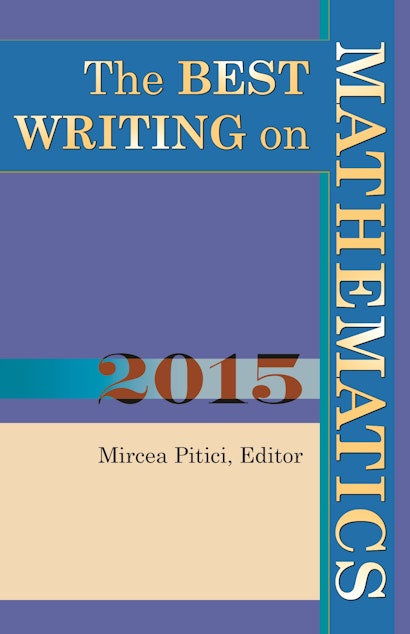This annual anthology brings together the year’s finest mathematics writing from around the world. Featuring promising new voices alongside some of the foremost names in the field, The Best Writing on Mathematics 2015 makes available to a wide audience many articles not easily found anywhere else—and you don’t need to be a mathematician to enjoy them. These writings offer surprising insights into the nature, meaning, and practice of mathematics today. They delve into the history, philosophy, teaching, and everyday occurrences of math, and take readers behind the scenes of today’s hottest mathematical debates.
Here David Hand explains why we should actually expect unlikely coincidences to happen; Arthur Benjamin and Ethan Brown unveil techniques for improvising custom-made magic number squares; Dana Mackenzie describes how mathematicians are making essential contributions to the development of synthetic biology; Steven Strogatz tells us why it’s worth writing about math for people who are alienated from it; Lisa Rougetet traces the earliest written descriptions of Nim, a popular game of mathematical strategy; Scott Aaronson looks at the unexpected implications of testing numbers for randomness; and much, much more.
In addition to presenting the year’s most memorable writings on mathematics, this must-have anthology includes a bibliography of other notable writings and an introduction by the editor, Mircea Pitici. This book belongs on the shelf of anyone interested in where math has taken us—and where it is headed.
Mircea Pitici holds a PhD in mathematics education from Cornell University, where he teaches math and writing. He has edited The Best Writing on Mathematics since 2010.
"The Best Writing on Mathematics does not shy away from mathematics, and that is why it shines. Pitici has done a wonderful job curating articles that form a cohesive . . . volume for readers seeking more than what popular mathematics books have to offer. Overall, this is a great book for the mathematically-experienced reader seeking to connect to mathematics outside of the world of textbooks and tests."—Douglas Whitaker, Key Reporter
"[A]nother wonderful variety of mathematical writings, this time with a distinct focus on mathematical games and puzzles. These intriguing—and sometimes unsolved—puzzles provide fuel for much contemplation and exploration of varied topics such as billiards, juggling, and the game Candy Crush. . . . Those picking up this collection for the math itself should be pleasantly surprised by the enlightening interdisciplinary work in philosophy, history, and art."—Publishers Weekly
"Pitici offers his annual selection of intriguing mathematical articles, and happily, 2015 was a banner year. [An] eclectic collection of nontechnical papers understandable to any reader. . . . A well-chosen collection supplemented by an outstanding further reading list."—Harold D. Shane, Library Journal
"I like expository articles on mathematics, but seldom have the time during the academic year to seek them out, so it is always a pleasure to have somebody like Pitici assemble a collection of good ones for me. This year's assortment, like those of the last few years, did not disappoint."—Mark Hunacek, MAA Reviews
"Dealing with topics of general interest—as history and philosophy, teaching, the occurrence of mathematics in everyday life, etc.—presented in an attractive and accessible manner, the books appeals to a large audience, including mathematicians of all levels of instruction, but also to anyone interested in the development of science and its applications."—Horia F. Pop, Studia Mathematica
"The idea behind this great series, which Pitici describes as ‘accessible but nontrivial content that presents for mathematicians and for the general public a wide assortment of informed and insightful perspectives on pure and applied mathematics, on topics related to the learning and teaching of mathematics, on the practice and practicality of mathematics, on the social and institutional aspects in which the mathematics themes, or on other themes related to mathematics,' was clearly presented in last year’s book and successfully continued in the one in front of us. We trust and hope that this will carry on in future years and we are definitely looking forward to it."—Aleksandar M. Nikolić, MathSciNet
"I found this book to be a great resource. The articles are easy to read and interesting to ponder. This book will be a valuable resource when my students in algebra and geometry want to look at a math concept for a project. The recent math applications in this book are a valuable resource."—Matthew Tucker, National Council of Teachers of Mathematics

